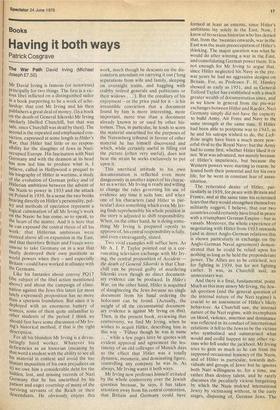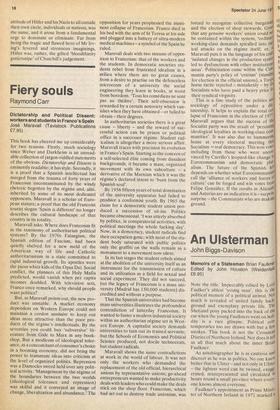Books
Having it both ways
Patrick Cosgrave
The war Path David Irving (Michael Joseph E7.50) Mr David Irving is famous (or notorious) Principally for two things. The first is a vicious libel inflicted on a distinguished sailor in a book purporting to be a work of scholarship: that cost Mr Irving and his then Publishers a great deal of money. (In a book on the death of General Sikorski Mr Irving similarly libelled Churchill, but that was safe, since Churchill was dead by then). The second is the repeated and emphasised conviction, expressed at some length in Hitler's War, that Hitler had little or no responsibility for the slaughter of Jews in Nazioccupied Europe. His fascination with Nazi Germany and with the deamon at its head has now led him to produce what is, I believe, called in Hollywood a prequel to his biography of Hitler in wartime, a study Of the evolution of German policy and of Hitlerian ambitions between the advent of the Nazis to power in 1933 and the attack O n Poland in 1939. In a sense the two books bearing directly on Hitler's personality, policy and methods of operation represent a logical culmination of all Mr Irving's work on the Nazis: he has come, so to speak, to the heart of the matter. And it is here that he can expound the central thesis of all his Work: that Hitlerian ambitions were centred above all on expansion in the East, and that therefore Britain and France were unwise to take Germany on in a war that ' finally destroyed their own positions as world powers when they – and especially Britain –could have worked in alliance with the Germans.
Like his fantasies about convoy P017 (the subject of the libel action mentioned above) and about the campaign of elimination against the Jews this latest (or most lately expressed) proposition has no more than a spurious foundation. But since it is deployed with an enormous battery of sources, some of them quite unfamiliar to Other students of the period I think we Should first have some discussion of Mr Irymg's historical method, if that is the right description. For all his blunders Mr Irving is a devas tatingly hard worker. Whatever his deficiencies as an historian (meaning by
that word a student with the ability to see all
his material in context and avoid the too blatant imposition of his own prejudices on it) we owe him a considerable debt for the hidden, lost, and missing records of Nazi Germany that he has unearthed by his Patient and eager courtship of many of the surviving servants of the Reich or their descendants. He obviously enjoys this work, much though he descants on the discomforts attendant on carrying it out (long separations from wife and family, sleeping on overnight trains, and haggling with crabby retired generals and politicians or their widows . . .'). But the corollary of his enjoyment – or the price paid for it – is his irresistible conviction that a document found by him is more interesting, more important, more true than a document already known to or used by other historians. Thus, in particular, he tends to scorn the material unearthed for the purposes of the Nuremberg tribunal in favour of other material he has himself discovered and which, while certainly useful in filling out the picture (often very useful), does not bear the strain he seeks exclusively to put upon it.
This uncritical attitude to his own documentation is reflected even more dangerously in another aspect of his character as a writer. Mr Irving is ready and willing to change the rules governing his use of evidence any time it suits him; and when one of his characters (and Hitler in particular) does something which even Mr Irving finds reprehensible his whole position in the story is adjusted to shift responsibility. When, on the other hand, he is doing something Mr Irving is prepared openly to approve of, his central responsibility is fully, and even extravagantly, stated.
Two vivid examples will suffice here. As Mr A. J. P. Taylor pointed out in a corruscating television exchange with Mr Irving, the central proposition of Accident — the death of General Sikorski is that Churchill can be proved guilty of murdering Sikorski even though no direct documentary evidence can be produced. In Hitler's War, on the other hand, Hitler is acquitted of slaughtering the Jews because no single document from his hand ordering the holocaust can be found. (Actually, the weight of all the circumstantial documentary evidence is against Mr Irving on this).
Then, in the present book, reviewing that controversy, we find Mr Irving, when he wishes to acquit Hitler, describing him in this way – 'Fiihrer though he was in name . ..' while a few pages later he quotes with evident approval and agreement the tes timony of an old colleague of Munich days to the effect that Hitler was a totally dynamic, mesmeric, and dominating figure, controlling any company he was in. As always, Mr Irving wants it both ways.
Mr Irving now professes himself irritated by the whole controversy over the Jewish question because, he says, it has taken attention away from his central contention, that Britain and Germany could have
formed at least an entente, since Hitler's ambitions lay solely in the East. Now, I know of no serious historian who has denied that, from the 'twenties onwards, war in the East was the main preoccupation of Hitler's thinking. The major question was what he would do after winning a war in the East, and consolidating German power there. It is not enough for Mr Irving to argue that, since Hitler neglected his Navy in the prewar years he had no aggressive designs on Britain. For, as Professor F. H. Hinsley showed as early as 1951, and as General Telford Taylor has established with a much greater wealth of documentation since, and as we know in general from the pre-war exchanges between Hitler and Raeder, Nazi Germany simply did not have the capacity to build Army, Air Force and Navy to the same strength at the same time. If Hitler had been able to postpone war to 1943, as he and his satraps wished to do, the Luftflotte might have been a much more powerful rival to the Royal Navy: but the Army had to come first, whether Hitler liked it or not. War was advanced, not merely because of Hitler's impatience, but because the Western powers were starting to rearm: he feared both their potential and for his own life, for he went in constant fear of assassination.
The reiterated desire of Hitler, particularly in 1939, for peace with Britain and France, and at the same time his reiterated fears that they would strengthen themselves militarily suggest, I believe, that our two countries could certainly have lived in peace with a triumphant German Empire –but as vassals. Moreover, the whole experience of negotiating with Hitler from 1933 onwards (and in direct Anglo-German relations this is shown particularly in exchange on the Anglo-German Naval agreement) demonstrated that he could be relied upon for nothing as long as he held the preponderant power. The Allies are to be criticised, not for fighting in 1939, but for not fighting earlier. It was, as Churchill said, an unnecessary war.
And there is a final, fundamental, point. Much as this may annoy Mr Irving, the Jew ish question (and the general question of the internal nature of the Nazi regime) is crucial to an assessment of Hitler's likely behaviour. As Churchill saw, the internal nature of the Nazi regime, with its emphasis on blood, violence, assertion and dominance was reflected in its conduct of international relations: it fell to the Jews to be the victims who symbolised and summarised what would and could happen to any other vic tims who fell under the jackboot. Mr Irving tries to gain as much as he can from the supposed occasional leniency of the Nazis, and of Hitler in particular, towards individuals and groups of Jews: but he ignores both Nazi willingness to, for a time, use rather than destroy talent, and he rarely discusses the peculiarly vicious bargaining by which the Nazis mulcted international Jewry by victimising without, in the early stages, disposing of, German Jews. The attitude of Hitler and his Nazis to all outside their own circle, individuals or nations, was the same, and it arose from a fundamental urge to dominate or eliminate. Far from being the tragic and flawed hero of Mr Irving's fevered and strenuous imaginings, Hitler was, rather, the gifted 'bloodthirsty guttersnipe' of Churchill's judgement.















































 Previous page
Previous page